Veneers vs Dental Crowns: What’s the Difference?

Veneers vs Dental Crowns: Whats the Difference and Which One Is Right for You?
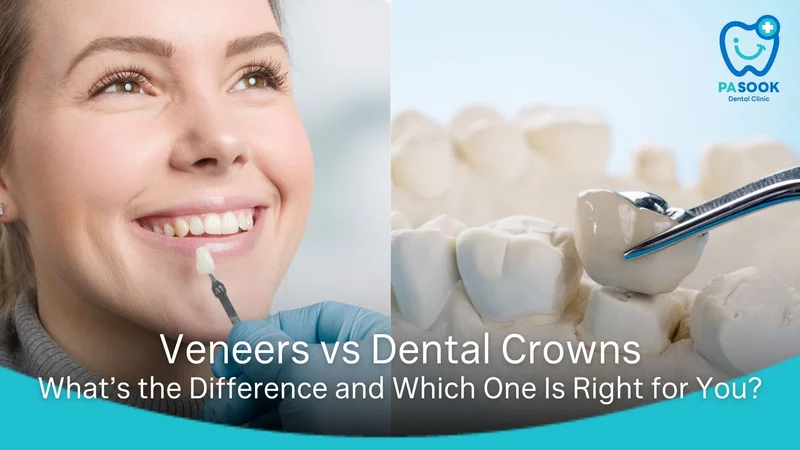
When it comes to achieving a confident smile , many people turn to cosmetic dental treatments like veneers or dental crowns to fix issues such as gaps, chipped teeth, or uneven tooth color. While both options can enhance the appearance of your teeth, they differ significantly in materials, procedures, durability, and suitability depending on your dental condition.
If youre wondering, Which is better, veneers or dental crowns? this article PASOOK Dental Clinic will help you understand the key differences and guide you in choosing the treatment that best suits your needs, so you can smile confidently from every angle.
Table of Contents
3.How Do Veneers Differ from Dental Crowns?
4.Which Is Right for You: Veneers or Dental Crowns?
5.Summary: Veneers vs. Dental Crowns by PASOOK Dental Clinic

What Are Veneers?
Veneers are ultra-thin shells made from materials designed to fit perfectly over the front surface of your teeth. They are bonded using dental adhesive to improve the appearance of your smile by correcting minor imperfections on your front teeth, such as discoloration, small chips, or gaps.
Types of Veneers:
1. Ceramic Veneers: Durable and highly aesthetic, ceramic veneers mimic the natural translucency of tooth enamel and are ideal for long-lasting results.
2. Composite Veneers: A more affordable option, composite veneers provide a quick fix but generally have a shorter lifespan compared to ceramic.
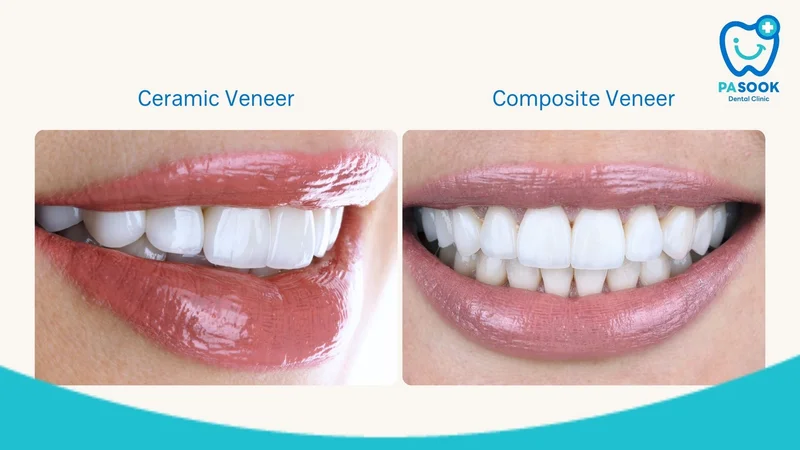
Benefits of Veneers
- Improve tooth alignment appearance without braces
- Naturally whiten and enhance your smile
- Quick procedure, usually completed within 1-2 visits
- Minimal tooth preparation required
What Are Dental Crowns?
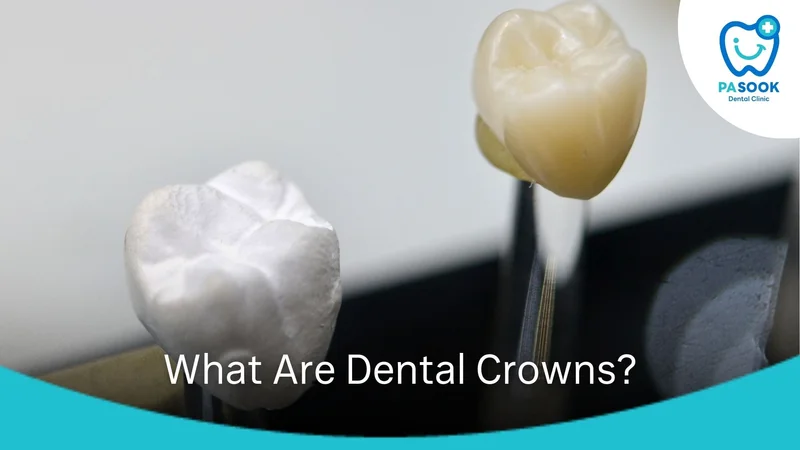
Dental crowns are restorative caps placed over damaged or weakened teeth to protect and strengthen them. They are commonly used for teeth with extensive decay, fractures, or after root canal treatments. The crown covers the entire tooth to restore its shape, size, strength, and appearance.
The procedure involves reshaping the tooth to allow for the crown placement. Crowns can be made from various materials, including metal, ceramic, or zirconia, depending on the tooths location and the patients preferences.
3 Common Types of Dental Crowns
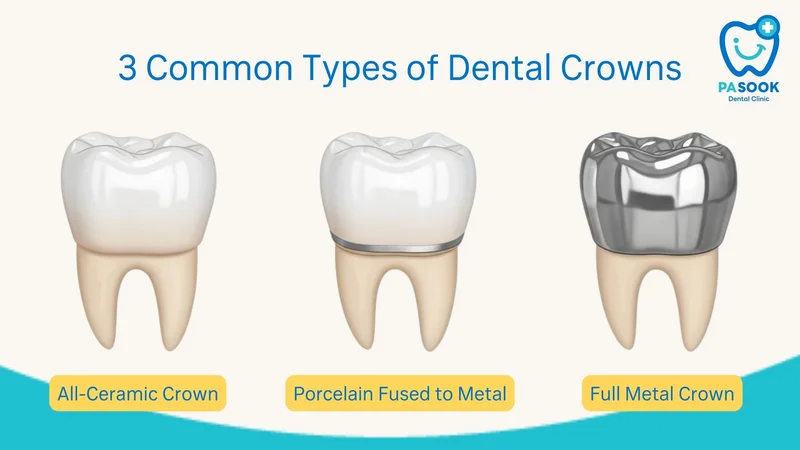
1. All-Ceramic Crown
Made entirely from ceramic, these crowns offer excellent aesthetics suitable for front teeth but have moderate strength.
2. Porcelain Fused to Metal - PFM
These combine a metal base for strength with a porcelain exterior for a natural look, suitable for both front and back teeth.
3. Full Metal Crown
Made from metals such as gold or alloys, these crowns are extremely durable but less natural in appearance, often used for molars.
Benefits of Dental Crowns
- Restore heavily damaged or weakened teeth
- Provide enhanced strength and durability
- Material options to match natural tooth color
How Do Veneers Differ from Dental Crowns?
Though both treatments aim to improve your smile, veneers and crowns have important differences:
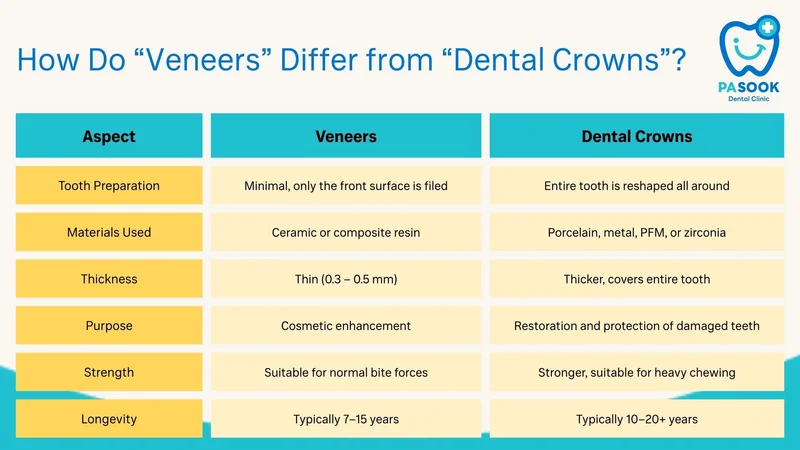
| Aspect | Veneers | Dental Crowns |
| Tooth Preparation | Minimal, only the front surface is filed | Entire tooth is reshaped all around |
| Materials Used | Ceramic or composite resin | Porcelain, metal, PFM, or zirconia |
| Thickness | Thin (0.3 0.5 mm) | Thicker, covers entire tooth |
| Purpose | Cosmetic enhancement | Restoration and protection of damaged teeth |
| Strength | Suitable for normal bite forces | Stronger, suitable for heavy chewing |
| Longevity | Typically 715 years | Typically 1020+ years |
Choosing between veneers and crowns depends on your overall dental health, the extent of tooth damage, and your aesthetic goals.
Which Is Right for You: Veneers or Dental Crowns?
Choosing between veneers and dental crowns should be based on the condition of your teeth and the professional advice of your dentist. Here are some general guidelines to help you understand which option might suit you best:
Who Should Consider Getting Veneers?
- Individuals with well-aligned front teeth seeking to improve color or shape
- Those with minor gaps, chips, discoloration, or enamel defects
- People wanting a natural-looking smile with minimal treatment time
- Patients committed to good oral hygiene without active decay
Ceramic veneers provide superior shine and durability, while composite veneers are budget-friendly options.

Who Should Consider Dental Crowns?
- Patients with cracked, heavily decayed, or worn-down teeth
- Teeth that have undergone root canal therapy or multiple restorations
- Individuals with heavy bite forces or severe tooth wear
- Those requiring both cosmetic improvement and structural support
Front dental crowns can also enhance appearance when more strength is needed than veneers can provide.
Summary: Veneers vs. Dental Crowns by PASOOK Dental Clinic
The choice between veneers and dental crowns should be personalized based on your dental condition and treatment goals. If you want to enhance your smile with minimal alteration to your natural teeth, veneers, especially ceramic or compositeare excellent options. However, for teeth that are significantly damaged or require reinforcement, dental crowns offer superior protection and longevity.
If youre unsure which option fits you best, consult with our expert dentists at PASOOK Dental Clinic. Our specialized team will evaluate your teeth and provide honest recommendations to help you achieve a healthy, beautiful smile tailored just for you.



